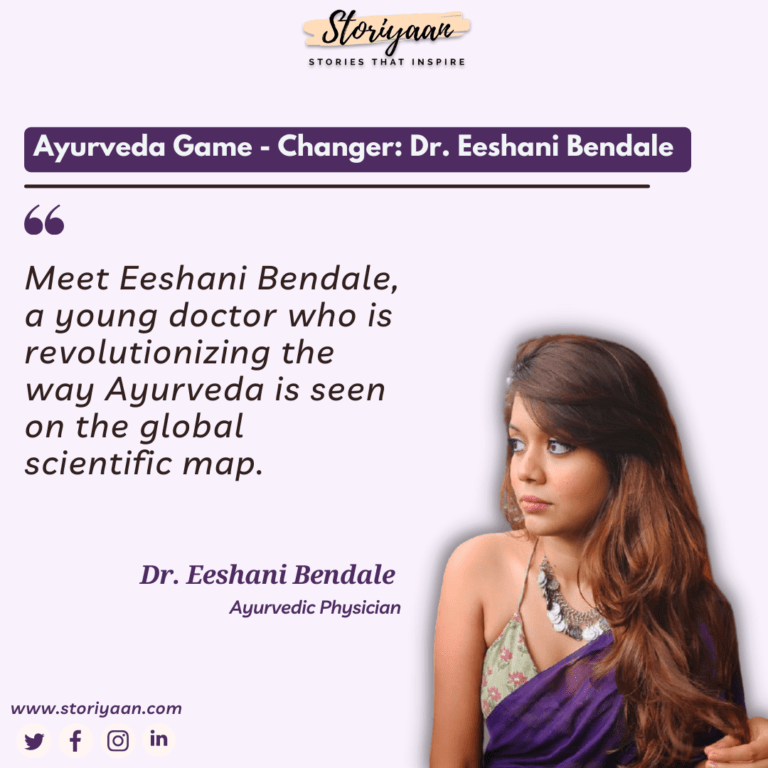“From a young age, I saw Ayurveda deliver colossal results. Thus, seeing the potential in Ayurveda, I wanted to make people aware of these treatments.”, emphasizes Eeshani.
Health is wealth and to discover treatments that are customizable according to your disease is surely a boon. The medical science of Ayurveda can be instrumental in your recovery but the lack of advocacy is appalling. Meet Dr. Eeshani Bendale who is tirelessly working towards bringing the awareness that Ayurvedic medicine deserves. She is the first Ayurvedic doctor to get admitted to the University Of Oxford, UK and has been a University topper and gold medalist in her undergraduate days.
Her enlightening speeches on Ayurveda and the need for authentic propagation and research in Ayurveda has won accolades across the world. She is popular for sharing her insight and deep knowledge on national as well as international platforms. If her brilliance is any measure, she has also helped curate a module called “Nava-Samhita” keeping on toes with her mastery and endless other achievements. Eeshani keeps herself busy with her research on Nano medicine and her interest in iatrochemistry and drug development.
Read more about the inimitable Eeshani in this indulging conversation with Storiyaan.

Interview
Questions and answers
Could you share with us the story behind your reason to be a doctor in Ayurveda?
As my parents are Ayurvedic doctors, I was introduced to it at a very young age. More importantly, I observed that patients with life-threatening terminal illnesses were also getting treated with Ayurveda. This made me pursue this medical science and bring greater awareness.
Currently you are pursuing an MSC in Nano-medicine from the UK and MSC in Evidence-Based Healthcare. What are your strategies to curb your workload as you have to juggle between these two courses simultaneously?
I have planned my modules such that I can devote my entire attention to the module at hand. I dislike doing things half-heartedly and hence, I try to be as efficient with my schedule as possible.
Could you elaborate on the usage of Nano-medicine in recent times and how it proves to be more efficient in treatment?
The nanoscale is 10:-9 and according to recent studies, biological processes in the human body take place on the same scale. Ayurveda has developed the science of nano-medicines which needs to be further explored, in recent times. This science is used in therapy, and diagnosis. Besides, treatment with medicines at that exact scale helps us combat pathologies in a better way and hence helps to get superior results.
In your second year of BAMS, you delivered a speech on "The principles of Ayurved" to doctors and scientists in Mexico. What was your experience on that and what were some of the ideas you spoke about?
It was a great opportunity to be able to share the knowledge of our medical science of Ayurveda with an international medical audience. It was an introductory speech on the principles and working of Ayurveda. This ensured that I throw light on the concepts and terminologies of the medical science of Ayurveda.
You are the first Ayurvedic Doctor to get admitted to the University Of Oxford, UK. The journey to this path must have lots of hurdles. What were those and how did you overcome them?
I never consider roadblocks as obstacles. There were some communication and linguistic differences at the time of my application but I looked at it as an opportunity to bridge the gap and tried my best to not let the challenges deter me.
Besides being a doctor, you are also an ardent researcher who has a keen interest in the global propagation of Ayurved. What are the ways you take out time for yourself when you feel overwhelmed in your professional life?
Although I am never overwhelmed with my work, I do binge on the latest movies and shows as I like to watch them and relax. Apart from that, a long drive and music are mind fresheners.
You came up with a module based on speculative design, "Nava Samhita". Can you elaborate on how that happened?
A friend of mine was working on a project based on speculative design. It is a branch of design where you take a hypothetical situation to understand its possible effects. His project was on ‘The History of Indian Sciences’ and he wanted to know how Ayurveda and Yoga would pan out if India was not colonised. Therefore, we collaborated to research the same.
As you are a gold medallist in SWASTHAVRITTA, could you enlighten us with how the medicinal process works in this particular field?
Swasthavritta can be translated to the subject of preventive and social medicine. In Ayurveda, the motive is ‘to maintain the health of the healthy’ and ‘to cure the disease of the diseased’. It contains a complete guide on how humans should maintain their health and prevent the development of diseases.
What are some of the misconceptions in the field of Ayurveda that people believe in and what would be your say on that?
I think it is because of the lack of communication in society and its high time, we bust the longstanding myths surrounding Ayurveda. As Ayurveda combats the pathologies from their very roots, it often seems to be a slow process but the time taken is the appropriate duration needed to cure a specific disease. It is not just symptomatic treatment. Furthermore, I think some people still consider it to be a pseudoscience which will eventually change with increased awareness.
For chronic diseases, how effectively do Ayurvedic medicines serve with lesser side effects on the patient's body?
I’d say that treating chronic diseases is the strength of Ayurveda because it can cure deep-rooted pathologies. Besides, it has been seen that it is extremely effective with chronic and critical diseases. In addition, Ayurveda has a deep understanding of body constitution and the different aspects that lead to the development of diseases that are critical for treatment. It considers the differences from one person to the other and has a customizable approach for patients. There is no one size fits all approach, in the science of Ayurveda.
Quick 5
- Your biggest inspiration – My father
- You blow off your steam with – Music, Movies, TV shows, and driving
- According to you, doctors are – Humans
- Your favourite food – Sushi
- Your current favourite binge – The Office.

